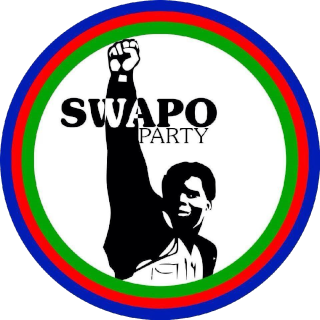
The South West Africa People's Organisation,officially known as the SWAPO Party of Namibia,is a political party and former independence movement in Namibia. Founded in 1960,it has been the governing party in Namibia since the country achieved independence in 1990. The party continues to be dominated in number and influence by the Ovambo ethnic group.

Samuel Shafiishuna Daniel Nujoma,is a Namibian revolutionary,anti-apartheid activist and politician who served three terms as the first President of Namibia,from 1990 to 2005. Nujoma was a founding member and the first president of the South West Africa People's Organization (SWAPO) in 1960. Before 1960,SWAPO was known as the Ovambo People's Organisation (OPO). He played an important role as leader of the national liberation movement in campaigning for Namibia's political independence from South African rule. He established the People's Liberation Army of Namibia (PLAN) in 1962 and launched a guerrilla war against the apartheid government of South Africa in August 1966 at Omugulugwombashe,beginning after the United Nations withdrew the mandate for South Africa to govern the territory. Nujoma led SWAPO during the lengthy Namibian War of Independence,which lasted from 1966 to 1989.
Hidipo Livius Hamutenya was a Namibian politician. Veteran politician Hidipo Hamutenya died at 77 after a short illness. A long-time leading member of the South West Africa People's Organization (SWAPO),Hamutenya was a member of the Cabinet of Namibia from independence in 1990 to 2004,serving in several important ministerial portfolios. He was defeated in a bid for the party's presidential nomination in 2004 and left SWAPO to form an opposition group,the Rally for Democracy and Progress (RDP),in 2007. He was elected to the National Assembly of Namibia with RDP in the 2009 general election. He was forced to step down as RDP president on 28 February 2015 and rejoined SWAPO on 28 August 2015.
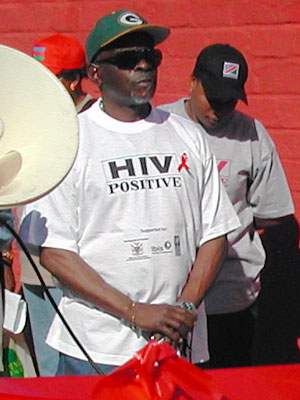
Nahas Gideon Angula is a Namibian politician who served as the third Prime Minister of Namibia from 21 March 2005 to 4 December 2012. He was succeeded by Hage Geingob in a cabinet reshuffle after the 2012 SWAPO Party congress. He subsequently served as Minister of Defence from 2012 to 2015.

Marco Mukoso Hausiku was a Namibian politician who was Deputy-Prime Minister of Namibia from 2010 to 2015.
Ben Ulenga is a Namibian trade unionist,politician,and diplomat. In the 1990s,he served under the SWAPO government as a deputy minister and as an ambassador,but he left SWAPO in 1998 and founded an opposition party,the Congress of Democrats (CoD),in 1999. He was a member of the National Assembly of Namibia from 2000 to 2015 and led the CoD until 2015.
Gibeon is a village in Gibeon Constituency in the Hardap Region of Namibia.

Rehoboth Rural is an electoral constituency in the Hardap region of Namibia. It had a population of 7,288 in 2011,down from 7,524 in 2001. The constituency office is in Schlip. Other settlements in Rehoboth Rural are Klein Aub,Khauxas and Rietoog. As of 2020,the constituency had 4,701 registered voters.
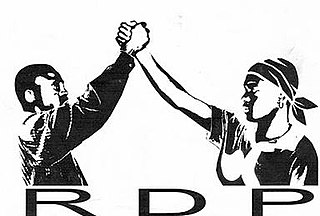
The Rally for Democracy and Progress (RDP) is a political party in Namibia. It was launched on 17 November 2007 under the leadership of Hidipo Hamutenya and Jesaya Nyamu,both former leading members of the ruling SWAPO party and cabinet ministers. Hamutenya had unsuccessfully sought the SWAPO nomination for President in 2004. At the time of the RDP's launch,it was considered to represent the strongest challenge to SWAPO's political dominance since the country gained its independence in 1990. According to Hamutenya,speaking at the RDP's launch,the party was "born in response to our people's deep longing for a vision,political direction and the rekindling of their hopes and aspiration for a better and prosperous future".
Pendukeni "Penny" Iivula-Ithana is a Namibian politician who served as the secretary general of SWAPO,Namibia's ruling party,from 2007 to 2012. She was a member of the Constituent Assembly of Namibia in 1989 and has been a member of Parliament and member of cabinet since independence in 1990.

General elections were held in Namibia on 27–28 November 2009. They were the fourth general elections since independence and the fifth democratic elections. Voting ended on 28 November and official election results,released on 4 December,showed that Hifikepunye Pohamba and his SWAPO Party were re-elected,each with over 75% of the vote. Prior to the election,the South West Africa People's Organization (SWAPO) was widely expected to score a landslide victory,with the Rally for Democracy and Progress (RDP) considered SWAPO's biggest challenger. Fourteen political parties competed for seats in the National Assembly of Namibia,and twelve candidates ran for the presidency.
Jesaya Nyamu is a Namibian politician. A member of the Rally for Democracy and Progress (RDP),he was a high level member of the South West Africa People's Organization (SWAPO) from 1964,when he fled into exile,until 2002,when he was expelled from the party for "disobedience". He was a member of SWAPO's central committee from 1975 until his expulsion from the party in 2002. In 2007,he registered a new political party,the Rally for Democracy and Progress (RDP) and was unanimously selected as the party's secretary general in 2008. He was elected to the National Assembly of Namibia with RDP in the 2009 general election.
2009 in Namibia refers to the events which occurred and will occur in the year of 2009 in the Republic of Namibia.
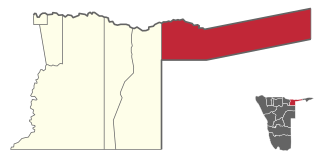
Mukwe is a constituency in the Kavango East region of Namibia. The district centre is the settlement of Mukwe. It had a population of 27,690 in 2011,up from 27,250 in 2001. The constituency contains the major settlements of Bagani,Kangongo and Divundu,and a number of small populated places such as Andara and Diyogha. As of 2020 the constituency had 16,678 registered voters.
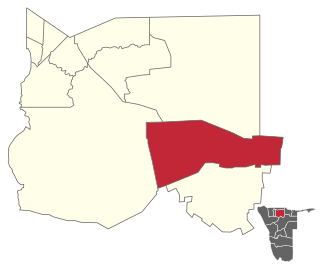
Guinas Constituency is an electoral constituency in the Oshikoto Region of Namibia. It had 8,435 inhabitants in 2004 and 4,210 registered voters in 2020. Guinas consists of the rural area surrounding the mining town of Tsumeb. Larger settlements in the Guinas constituency are Oshivelo and Tsintsabis.

The Cabinet of Namibia is an appointed body that was established by Chapter 6 of the Constitution of Namibia. It is mandated to include the following positions:the President of Namibia,the Prime Minister of Namibia and any positions that the President so appoints.

General elections were held in Namibia on 28 November 2014,although early voting took place in foreign polling stations and for seagoing personnel on 14 November. The elections were the first on the African continent to use electronic voting.












